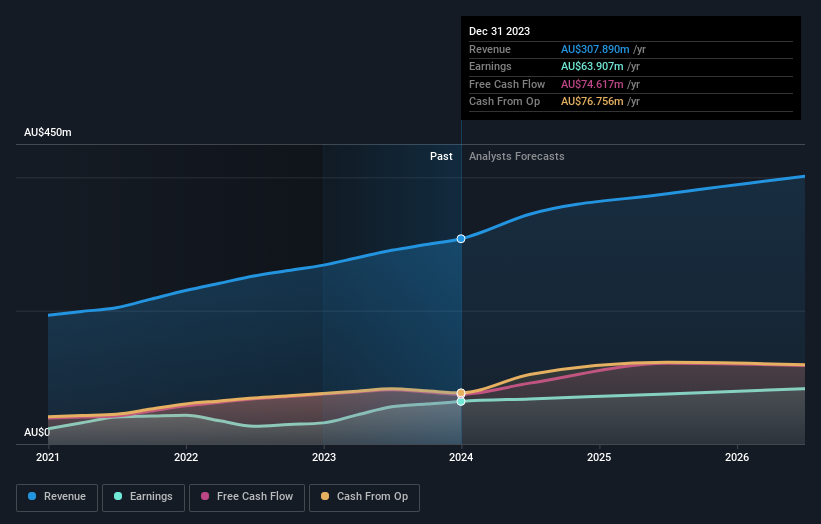Retail investors who hold 47% of PSC Insurance Group Limited (ASX:PSI) gained 7.8%, insiders profited as well

Key Insights
- The considerable ownership by retail investors in PSC Insurance Group indicates that they collectively have a greater say in management and business strategy
- The top 15 shareholders own 50% of the company
- Insider ownership in PSC Insurance Group is 43%
To get a sense of who is truly in control of PSC Insurance Group Limited (ASX:PSI), it is important to understand the ownership structure of the business. With 47% stake, retail investors possess the maximum shares in the company. In other words, the group stands to gain the most (or lose the most) from their investment into the company.
Retail investors gained the most after market cap touched AU$2.0b last week, while insiders who own 43% also benefitted.
Let's delve deeper into each type of owner of PSC Insurance Group, beginning with the chart below.
See our latest analysis for PSC Insurance Group

What Does The Institutional Ownership Tell Us About PSC Insurance Group?
Institutions typically measure themselves against a benchmark when reporting to their own investors, so they often become more enthusiastic about a stock once it's included in a major index. We would expect most companies to have some institutions on the register, especially if they are growing.
We can see that PSC Insurance Group does have institutional investors; and they hold a good portion of the company's stock. This suggests some credibility amongst professional investors. But we can't rely on that fact alone since institutions make bad investments sometimes, just like everyone does. It is not uncommon to see a big share price drop if two large institutional investors try to sell out of a stock at the same time. So it is worth checking the past earnings trajectory of PSC Insurance Group, (below). Of course, keep in mind that there are other factors to consider, too.

Hedge funds don't have many shares in PSC Insurance Group. Paul Dwyer is currently the company's largest shareholder with 16% of shares outstanding. Meanwhile, the second and third largest shareholders, hold 9.5% and 8.9%, of the shares outstanding, respectively. Note that the second and third-largest shareholders are also Senior Key Executive and Vice Chairman, respectively, meaning that the company's top shareholders are insiders. Furthermore, CEO Antony Robinson is the owner of 1.0% of the company's shares.
Looking at the shareholder registry, we can see that 50% of the ownership is controlled by the top 15 shareholders, meaning that no single shareholder has a majority interest in the ownership.
While it makes sense to study institutional ownership data for a company, it also makes sense to study analyst sentiments to know which way the wind is blowing. There are plenty of analysts covering the stock, so it might be worth seeing what they are forecasting, too.
Insider Ownership Of PSC Insurance Group
The definition of an insider can differ slightly between different countries, but members of the board of directors always count. Management ultimately answers to the board. However, it is not uncommon for managers to be executive board members, especially if they are a founder or the CEO.
I generally consider insider ownership to be a good thing. However, on some occasions it makes it more difficult for other shareholders to hold the board accountable for decisions.
Our information suggests that insiders maintain a significant holding in PSC Insurance Group Limited. It has a market capitalization of just AU$2.0b, and insiders have AU$843m worth of shares in their own names. That's quite significant. Most would say this shows a good degree of alignment with shareholders, especially in a company of this size. You can click here to see if those insiders have been buying or selling.
General Public Ownership
With a 47% ownership, the general public, mostly comprising of individual investors, have some degree of sway over PSC Insurance Group. While this size of ownership may not be enough to sway a policy decision in their favour, they can still make a collective impact on company policies.
Private Company Ownership
Our data indicates that Private Companies hold 5.0%, of the company's shares. Private companies may be related parties. Sometimes insiders have an interest in a public company through a holding in a private company, rather than in their own capacity as an individual. While it's hard to draw any broad stroke conclusions, it is worth noting as an area for further research.
Next Steps:
I find it very interesting to look at who exactly owns a company. But to truly gain insight, we need to consider other information, too. To that end, you should be aware of the 1 warning sign we've spotted with PSC Insurance Group .
But ultimately it is the future, not the past, that will determine how well the owners of this business will do. Therefore we think it advisable to take a look at this free report showing whether analysts are predicting a brighter future.
NB: Figures in this article are calculated using data from the last twelve months, which refer to the 12-month period ending on the last date of the month the financial statement is dated. This may not be consistent with full year annual report figures.
New: Manage All Your Stock Portfolios in One Place
We've created the ultimate portfolio companion for stock investors, and it's free.
• Connect an unlimited number of Portfolios and see your total in one currency
• Be alerted to new Warning Signs or Risks via email or mobile
• Track the Fair Value of your stocks
Have feedback on this article? Concerned about the content? Get in touch with us directly. Alternatively, email editorial-team (at) simplywallst.com.
This article by Simply Wall St is general in nature. We provide commentary based on historical data and analyst forecasts only using an unbiased methodology and our articles are not intended to be financial advice. It does not constitute a recommendation to buy or sell any stock, and does not take account of your objectives, or your financial situation. We aim to bring you long-term focused analysis driven by fundamental data. Note that our analysis may not factor in the latest price-sensitive company announcements or qualitative material. Simply Wall St has no position in any stocks mentioned.
About ASX:PSI
PSC Insurance Group
Provides diversified insurance services in Australia, the United Kingdom, rest of Asia, Hong Kong, New Zealand, Ireland, Bermuda, and Vietnam.
Excellent balance sheet with limited growth.
Market Insights
Community Narratives




